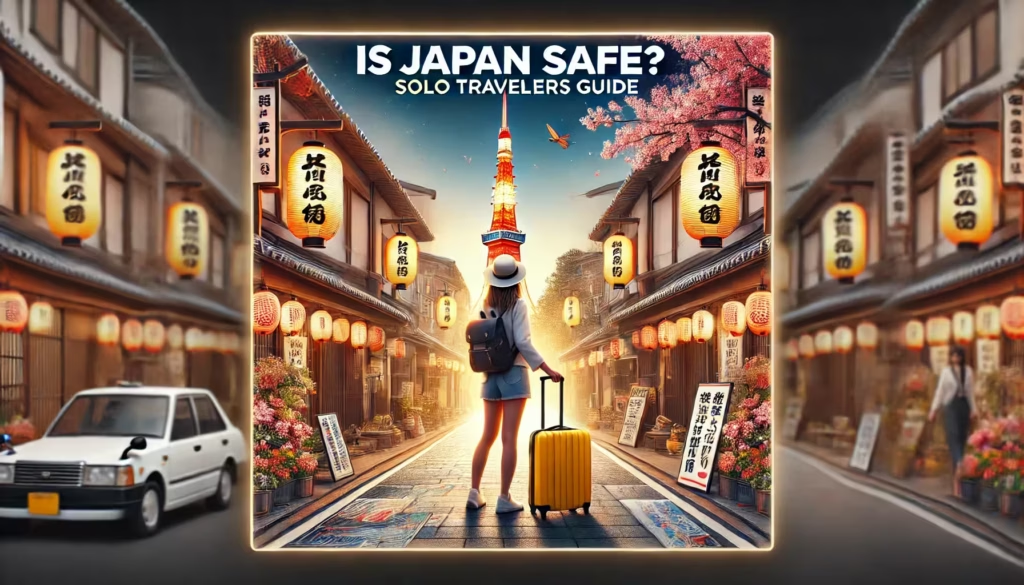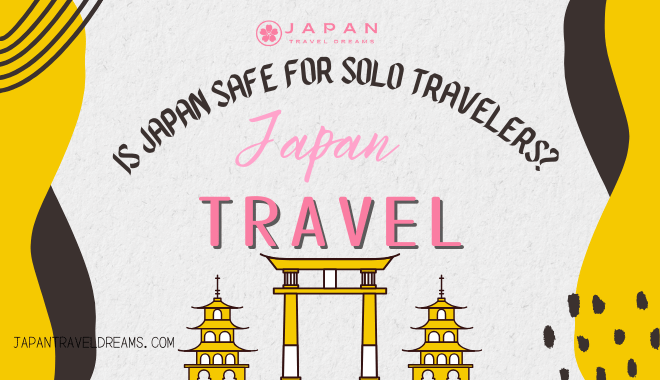Japan, a land where ancient traditions blend seamlessly with futuristic innovations, is a dream destination for travelers worldwide. For those considering embarking on a solo journey, the question often arises: Is Japan safe for solo travelers? The answer is a resounding yes.
Is Japan Safe for Solo Travelers?

This guide will explore why Japan is one of the safest countries for solo adventurers and provide practical tips and insights to ensure a memorable and secure experience.
The Safety of Japan: An Overview
Japan consistently ranks among the safest countries in the world, a reputation supported by low crime rates and a strong sense of community responsibility. The Japanese culture places a high value on respect, harmony, and public order, contributing to a secure environment for residents and visitors alike. Solo travelers, in particular, will find Japan to be welcoming and accommodating, with a wealth of resources and services tailored to their needs.
Safety as a Core Value
In Japan, safety is not just a feature but a cultural cornerstone. The country’s infrastructure is designed with security in mind, from its meticulously maintained streets to its advanced disaster preparedness systems. Public spaces are clean and well-organized, and the public transport system is one of the most reliable and safest in the world. This commitment to safety is deeply ingrained in the national psyche, providing solo travelers with peace of mind as they explore.
Crime Rates and Common Concerns
Japan’s crime rate is notably low, especially in comparison to other developed countries. Violent crime is rare, and petty crimes like pickpocketing are infrequent. However, as with any destination, it’s essential to remain vigilant and take basic precautions.
Common Concerns
- Pickpocketing: While uncommon, it can occur in crowded areas. Keep your belongings secure and be aware of your surroundings. Using a money belt or crossbody bag can help deter potential thieves.
- Scams: Tourist scams are rare but can happen. Be cautious of overly friendly strangers offering unsolicited help or deals that seem too good to be true. Always verify the authenticity of offers and services.
- Nightlife Safety: Japan’s nightlife is vibrant and generally safe. However, it’s wise to stay alert and avoid accepting drinks from strangers. Stick to well-known establishments and trust your instincts if something feels off.
Related: About Japan Travel Dreams
Cultural Norms and Their Impact on Safety
Japan’s cultural norms significantly contribute to the country’s safety. The emphasis on respect, community, and social responsibility creates an environment where crime is minimized, and help is readily available.
Key Cultural Norms
- Respect for Others: The Japanese culture values politeness and consideration for others, which translates into everyday interactions that are respectful and orderly. This mutual respect helps maintain a peaceful society where crime is less likely to occur.
- Community Vigilance: Neighborhoods often have local watch groups that help maintain safety and report suspicious activities. This community involvement plays a crucial role in crime prevention and creates a supportive environment for residents and visitors alike.
- Lost and Found Efficiency: Japan is known for its efficient lost and found system. Items left in public places are often turned in to authorities and can be reclaimed by their owners. This system reflects the honesty and integrity prevalent in Japanese society.
Transportation Safety for Solo Travelers
Japan’s transportation system is renowned for its efficiency and safety, making it ideal for solo travelers. Whether navigating bustling cities or exploring rural areas, you’ll find the public transport network to be reliable and user-friendly.
Public Transport
- Trains and Subways: Japan’s trains and subways are punctual, clean, and safe. Stations are well-marked with English signage, and staff are available to assist if needed. The shinkansen, or bullet train, offers a high-speed travel option that is both efficient and comfortable.
- Buses: Bus services are comprehensive and provide access to more remote areas. Routes are clearly marked, and drivers are generally helpful, making it easy for solo travelers to explore off-the-beaten-path destinations.
Taxis and Ride-Sharing
- Taxis: Taxis are safe and trustworthy, though they can be more expensive than public transport. Drivers are professional and often courteous, providing a reliable option for late-night travel or when public transport is less accessible.
- Ride-Sharing: Services like Uber are available in some areas, though traditional taxis are more common. Ride-sharing can be a convenient alternative, particularly in urban areas.
Related: Tips for Using Public Transport in Japan
Accommodation Options for Solo Travelers
Japan offers a wide range of accommodation options that cater to solo travelers, from budget-friendly hostels to luxurious ryokans. Safety and comfort are prioritized across all types of lodging.
Hostels and Guesthouses
- Social Atmosphere: Hostels provide a social environment where solo travelers can meet others. Many offer private rooms and secure storage for belongings. The communal areas often host events and activities, fostering connections between guests.
- Guesthouses: These often offer a more intimate setting, with hosts who can provide local insights and assistance. Staying in a guesthouse allows for a more personalized experience and a deeper connection with Japanese culture.
Hotels and Ryokans
- Business Hotels: Ideal for solo travelers, business hotels offer compact rooms with essential amenities at reasonable rates. They are typically located near train stations and business districts, providing convenience for travelers on the go.
- Ryokans: For a cultural experience, staying at a ryokan offers insights into Japanese traditions. They are generally safe and welcoming to solo travelers, with opportunities to enjoy traditional Japanese hospitality.
Capsule Hotels
- Unique Experience: Capsule hotels offer a uniquely Japanese experience with compact sleeping pods. They are safe, clean, and often located near major transport hubs. Capsule hotels are perfect for solo travelers seeking novelty and affordability.
Related: Best Onsen Towns in Japan
Exploring Cities and Rural Areas Alone
Japan’s diverse landscapes offer endless exploration opportunities, from bustling cities to tranquil countryside. Solo travelers can enjoy both environments safely with a few considerations.
City Exploration
- Urban Safety: Cities like Tokyo, Kyoto, and Osaka are safe for solo travelers. Use common sense, especially at night, and stay in well-lit areas. Public transportation is reliable and secure, making it easy to explore urban attractions.
- Landmark Visits: Major attractions are well-policed and have clear signage in multiple languages to assist solo visitors. Many sites offer guided tours, providing insights into Japan’s rich history and culture.
Rural Adventures
- Nature Trails: Japan’s rural areas offer beautiful hiking trails and scenic spots. Ensure you have a map, and let someone know your plans if venturing into remote areas. Many trails are well-marked, and local tourism offices can provide information on safe routes.
- Local Communities: Rural communities are welcoming but may have fewer English speakers. Learning basic Japanese phrases can enhance your experience and safety, allowing for meaningful interactions with locals.
Related: Hidden Travel Spots in Japan
Solo Dining and Socializing in Japan
Japan is a culinary paradise, and dining alone is both common and enjoyable. Solo travelers can explore a variety of dining experiences without feeling out of place.
Dining Alone
- Ramen Shops and Izakayas: These establishments often have counter seating, making them perfect for solo diners. The atmosphere is casual, and staff are generally accommodating. Enjoying a bowl of ramen or a selection of izakaya dishes is a quintessential Japanese experience.
- Conveyor Belt Sushi: Enjoy a variety of sushi without the pressure of ordering. Plates are priced per piece, allowing for a customizable experience. This dining style is popular among solo travelers for its convenience and variety.
Social Opportunities
- Meetup Groups: Join local meetup groups or language exchanges to connect with both locals and fellow travelers. Platforms like Meetup and Couchsurfing often host events that welcome newcomers.
- Community Events: Participate in festivals or community events for a chance to socialize and experience Japanese culture firsthand. These events offer unique insights into local traditions and are a great way to meet people.
Related: Best Street Food Markets in Japan
Health and Emergency Services
Japan’s healthcare system is advanced and efficient, ensuring that solo travelers have access to necessary services in case of emergencies.
Medical Facilities
- Hospitals and Clinics: Japan has a wide network of hospitals and clinics, many with English-speaking staff. It’s advisable to have travel insurance that covers medical expenses, ensuring access to quality care without financial strain.
- Pharmacies: Known as “yakkyoku,” pharmacies are widely available and can provide over-the-counter medications for minor ailments. Pharmacists are knowledgeable and can assist with basic health concerns.
Emergency Contacts
- Police: Dial 110 for police assistance. Officers are generally helpful and can assist with lost items or other concerns. Police boxes, or “koban,” are located throughout cities and provide a reassuring presence.
- Emergency Services: Dial 119 for ambulance or fire services. English-speaking operators are available in major cities, ensuring effective communication in times of need.
Related: About Japan Travel Dreams
Tips for Staying Safe and Connected
While Japan is safe, it’s always wise to take precautions to ensure your personal safety and security.
Stay Connected
- Mobile SIM Cards or Wi-Fi: Consider purchasing a SIM card or renting a portable Wi-Fi device to stay connected. This is particularly useful for navigation and communication, allowing you to access maps and translation apps on the go.
- Keep Contact Information Handy: Have the contact details of your accommodation and local emergency services readily accessible. This can be a lifeline in unfamiliar situations.
Personal Safety Tips
- Trust Your Instincts: If something feels off, trust your instincts and remove yourself from the situation. Solo travelers should prioritize their well-being and comfort.
- Stay Informed: Keep up with local news and weather updates, especially if traveling to areas prone to natural disasters. This awareness can help you make informed decisions and avoid potential hazards.
Related: How to Plan a 7-Day Japan Itinerary
Cultural Etiquette and Respect
Understanding and respecting cultural norms can enhance your safety and experience as a solo traveler in Japan.
Social Etiquette
- Politeness: Being polite and respectful goes a long way. Use phrases like “arigatou gozaimasu” (thank you) and “sumimasen” (excuse me) to show respect. These simple gestures are appreciated and can foster positive interactions.
- Quietness: Public spaces are typically quiet. Keep noise levels down, especially on public transport. Respect for others’ space and comfort is a key aspect of Japanese culture.
Dress Code
- Appropriate Attire: Dress modestly, especially when visiting temples or shrines. Wearing clean and neat clothing is generally appreciated. Adhering to local dress codes demonstrates respect for cultural traditions.
Related: Honeymoon in Japan: Romantic Getaways and Luxury Ryokans
Best Places for Solo Travelers
Japan is a country teeming with diverse landscapes and vibrant cities, each offering unique experiences for solo travelers. Whether you seek the hustle and bustle of urban life or the tranquility of nature, Japan has something for everyone. Here are some of the best destinations for solo adventurers to explore:
Tokyo: The Dynamic Metropolis
As Japan’s capital and largest city, Tokyo is a must-visit for any solo traveler. Its blend of tradition and modernity provides endless exploration opportunities. From the historic Asakusa district, where you can visit the iconic Senso-ji Temple, to the futuristic skyline of Shinjuku, Tokyo offers a captivating experience for every visitor.
- Cultural Highlights: Visit the Meiji Shrine and explore the quiet beauty of the Imperial Palace Gardens.
- Neighborhoods to Explore: Dive into the eclectic vibe of Harajuku, shop in Shibuya, and enjoy the nightlife in Roppongi.
Kyoto: The Heart of Tradition
Known for its well-preserved temples and traditional tea houses, Kyoto is a city where Japan’s rich history comes alive. Solo travelers can enjoy serene strolls through the Arashiyama Bamboo Grove or experience the tranquility of a traditional tea ceremony.
- Must-See Temples: Kinkaku-ji (Golden Pavilion) and Fushimi Inari Taisha with its iconic red torii gates.
- Cultural Experiences: Participate in a kimono rental experience and explore the historic streets of Gion.
Hiroshima: A City of Peace and Resilience
Hiroshima is a city known for its historical significance and message of peace. Solo travelers can visit the Hiroshima Peace Memorial Park and Museum to understand the city’s past and its journey towards peace and reconciliation.
- Island Adventure: Take a short ferry ride to Miyajima Island to see the floating torii gate of Itsukushima Shrine.
- Local Cuisine: Try Hiroshima-style okonomiyaki, a savory pancake filled with various ingredients.
Osaka: The Culinary Capital
Osaka is famed for its vibrant street food scene and lively atmosphere. Solo travelers can explore Dotonbori, a bustling area filled with neon lights and delicious eateries offering local specialties like takoyaki and kushikatsu.
- Cultural Landmarks: Visit Osaka Castle and take a stroll through the Osaka Aquarium.
- Shopping and Entertainment: Explore the trendy shops in Shinsaibashi and the entertainment district of Namba.
Hokkaido: Nature’s Paradise
For those seeking an escape into nature, Hokkaido offers breathtaking landscapes and outdoor adventures. From the flower fields of Furano to the rugged cliffs of Shiretoko National Park, solo travelers can immerse themselves in the natural beauty of Japan’s northernmost island.
- Winter Sports: Enjoy skiing or snowboarding in Niseko, one of Japan’s top winter sports destinations.
- Hot Springs: Relax in a traditional onsen, with many options available in the scenic town of Noboribetsu.
Related: Hidden Travel Spots in Japan
Nara: A Glimpse into Japan’s Ancient Past
Nara, Japan’s first permanent capital, is home to historic treasures and friendly free-roaming deer. Solo travelers can explore Nara Park, where tame deer bow for treats, and visit the Todai-ji Temple, housing a giant bronze Buddha statue.
- Historical Sites: Discover the ancient architecture of Horyu-ji, one of the oldest wooden buildings in the world.
- Cultural Activities: Engage in traditional crafts workshops, such as calligraphy or pottery making.
Conclusion: Embrace the Adventure
Japan is not only safe for solo travelers but also offers a rich tapestry of experiences that are best explored independently. From the bustling streets of Tokyo to the serene landscapes of rural Japan, every corner of this fascinating country welcomes the solo adventurer with open arms. Embrace the adventure, immerse yourself in the culture, and discover the unique charm of Japan at your own pace.
This guide aims to equip you with the knowledge and confidence to explore Japan safely and meaningfully. For more travel tips and insights, explore the resources available on JapanTravelDreams.com. Safe travels and enjoy your



